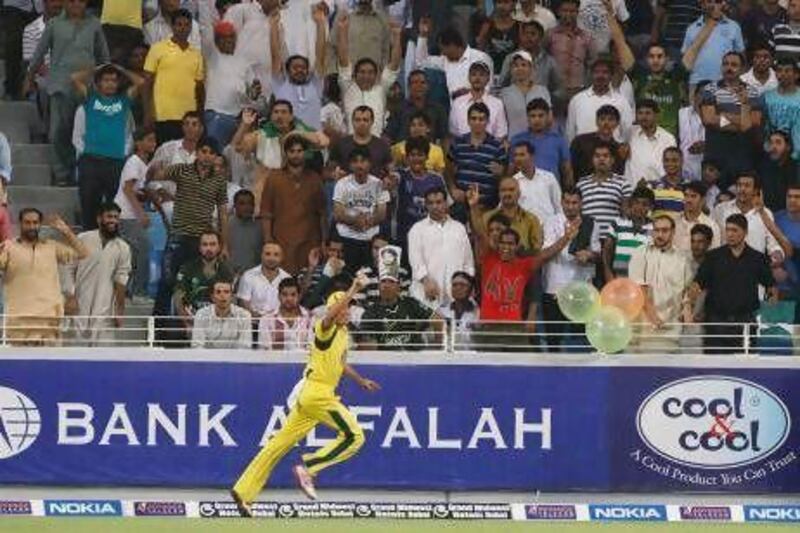It was only natural for a little weariness to sneak in before the start of this very brief series between Pakistan and Australia.
The three one-day internationals and three Twenty20s felt like they had been shoved into an already packed calendar and, at least for the ODIs, there did not appear any reason for them to exist, other than that the broadcasters wanted them to.
And to play an international series in the UAE in August and September was surely madness. Even if they pushed the games well into the evening, it was still going to be too crazy hot and humid. And who would even turn up for them?
But as the final Twenty20 played itself out last night in Dubai, an admission had to be formed. At nearly two-thirds full It did not look, feel or sound like a dead rubber, or a weeknight. The tour has actually gone much better than might have been expected. How?
The cricket was close enough to become significant. The individual results probably do not reflect how well matched both sides actually were (although the overall series scorelines do). Every game other than the first and last T20 was alive deep into it, leaning here and there before gently falling in favour of one side, turned on a missed catch, a review not taken, a tiny misjudgement.
And with the games already so tight, the weather conditions actually put another layer on to it all.
Cricket is often derided by those who don't really follow it for not being a particularly physical and taxing sport and sometimes, watching a sweat-less Test session in England, you could even begin to wonder yourself.
But one look at any of the games here and the full effect of just what these athletes were putting into the game was never more apparent. The abiding image is of Michael Hussey, who is probably fit enough to complete a triathlon or two before play starts, on his haunches on the boundary line between every delivery in the Abu Dhabi ODI.
Despite losing the ODI series, Pakistan will probably emerge from this fairly content, if only because the subsequent Twenty20 win should set them up nicely for the World T20. Their batting still does not look entirely convincing but at least they can now fall back on a greater variety of options than before.
If they do get far it will be because of their bowling and specifically because of Saeed Ajmal, currently the world's form bowler. Some amount of outrage is necessary to fuel any series these days and this one duly had plenty of it in the non-selection of Ajmal as one of the ICC's Cricketers of the Year.
Privately, how can he not have felt some degree of snub? But his public response has been the right one: to bowl as well as he has ever done in these formats.
Whether the ICC's jury think it or not, there have been very few, if any, more influential cricketers over the last year across all formats.
But on this evidence, and particularly from last night's final game, Australia may finally be getting there in this format. They are anyway adept at minimising the impact of their greatest weaknesses and not too much should be read into their rankings drop.
If Shane Watson and David Warner can reproduce the violent barrage of six-hitting they did here, then who knows how far they go? Their pace attack will make an impression, just as it did in the 2010 World T20.
But a thought does occur. Michael Clarke is not a part of the Twenty20 set-up, but is he not worth a punt given how good he is against spin? He has been their most accomplished batsman in these conditions.
We return though to the crowds, full-throated and committed in numbers, for why this series will not be another forgotten limited-overs tour. Not every match need be played on a Friday in the UAE was the message. Every one of the games had healthy attendances and for Pakistan at least (in some moods looking very formidable on these surfaces), more than at any other time in their exile, the UAE began to feel more and more like some kind of a home.





